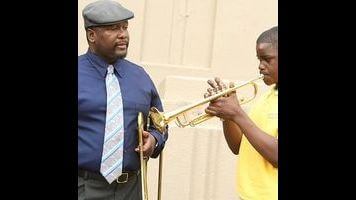Treme: "Shame, Shame, Shame"

For my money, there hasn’t been a single more joyous moment this season on Treme than Toni enthusiastically rushing over to her husband, the eternally cantankerous Creighton, during a Second Line performance that had realized their hopes and completely surpassed their expectations. And the reason why it’s so poignant—and this dynamic is true of the show in general—is that most of the time we see them struggling, tilting at the windmills of local bureaucracies and federal ineptitude and indifference. It was one of those intermittent times on the show where something happens that lifts the characters’ spirits and reminds us what they’re fighting for. These transcendent moments almost always music-related. And they’re always, sadly, short-lived.
In this case, shots ring out. And with them, the hopes (or illusion) of a city that’s finding its way back are instantly dashed. For Creighton, it’s time to retreat to YouTube for more profane missives against the empty promises of the Bush administration. For Toni, it’s back to sifting through the scattered (and sometimes water-damaged or just plain lost) files of a criminal justice system in disarray and getting answers from authority figures who are hopelessly taxed at best, corrupt and abusive at worst. Nevertheless, it isn’t all about fighting the good, unwinnable fight for these two; they’re invested in the city and the city gives back to them in kind.
Nevertheless, one of the things I love about Treme is that it doesn’t let the righteousness of characters like Toni and Creighton go unchallenged. As much as we might say “Amen” to Creighton’s bile-filled YouTube videos, they’re not necessarily all that well-judged or productive—in the end, he may be just venting, nothing more. Meanwhile, he’s got a book six years overdue and his agent is coming to collect an advance he’s long since squandered on other things, suggesting at a minimum that his energies are misdirected. And what a pleasure it was to have David Morse as a sympathetic police lieutenant, bringing perspective to Toni’s conclusion about Antoine’s missing trombone. Yes, the cops beat Antoine up and arrested him without cause. Yes, they stole his trombone and pawned it off. But they, too, are as poor, desperate, and stressed to the breaking point as anyone else, and another crime wave about to beset the city, The Case Of The Missing Trombone is unfortunate, but relatively minor.
“Shame, Shame, Shame” is an episode about homecoming—and all the wonderful and terrible possibilities it presents. Homecoming means friends, family, and bandmates are reuniting, and helping to make the city whole again. And homecoming also introduces some practical problems, like people not having homes or jobs to come back to and the inevitable spike in mischief when the city’s frayed police force and infrastructure can’t support its residents. The great Second Line sequence embodied the situation perfectly; it must have been tempting for the writers to simply allow this joyous and spontaneous celebration to go on unbroken, given all the shit everyone’s been going through. But there’s an ugly side to it, too—one they’re right to believe will be played up by the national media—and that can’t be glossed over.
So how I have gotten this far without mentioning Tom Colicchio, Eric Ripert, Wylie Dufresne, and David Chang turning up at Janette’s restaurant? It’s like my own TV blog crossover event: Top Chef meets Treme. The chefs needn’t quit their day jobs in pursuit of an acting career—though I know of several people who would like to see more of Colicchio (wink, wink)—but their appearance brought some levity to the episode. I love how Janette decides to “lowball” her guests with crawfish over grits and sweetbreads (snooty chef types do love their offal), and I think the show gets the challenges and joys of chefs cooking for each other. It’s gut-wrenching but exhilarating. (And thank goodness the stoves stayed lit.)
Speaking of odd fantasy encounters, what do you make of Antoine’s odyssey with the Japanese jazz enthusiast? I know I should think of it as the ultimate dramatic contrivance—sort of an ethnic twist on the “Magical Negro” scenario—but damned if it wasn’t funny, offbeat, and a little moving, too. It’s just like Antoine to let a petty argument over an obscure piece of jazz history nearly sabotage his shot at a free trombone, and very much in character also for him to repay his benefactor by giving him a show. The culture clash between these two men—and Antoine’s ability to flatter his benefactor for money while occasionally mixing it up with him despite his best interests—made the subplot a lively diversion.
 Keep scrolling for more great stories.
Keep scrolling for more great stories.
